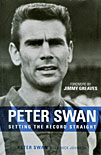 Setting The Record Straight
Setting The Record Straight
by Peter Swan with Nick Johnson
Stadia, £17.99
Reviewed by Harry Pearson
From WSC 239 January 2007
It is the misfortune of some professional footballers to have their entire careers defined in the public mind by one terrible mistake. The glaring miss in a cup final, a blundering attempt to deal with a weak shot, or an idiotic injury are sometimes all we recall of men who played hundreds of games at the top level. Peter Swan is one such player, though his error was of a slightly different sort. In December 1962 he and Sheffield Wednesday team-mates Tony Kay and David Layne placed bets on Ipswich Town to win when the two teams met at Portman Road. Two years later, following a tabloid exposé of match-rigging and a police investigation, Mansfield Crown Court sent Swan – who pleaded not guilty – to jail for four months and fined him £100. The Football Association, meanwhile, banned him from the game for life (the ban was eventually lifted in 1972).
And that, I think it’s fair to say, is all that most of us know of Peter Swan. At the time of his jail sentence the centre-half was 28 and at the peak of his powers. He had played close to 300 games for Wednesday and made 19 appearances for England. He was a rugged and athletic player, good enough to convince many – including Jimmy Greaves – that had the People not intervened he, rather than Jack Charlton, might have partnered Bobby Moore in the centre of England’s defence in 1966.
This, then, is Swan’s attempt to get a bit of recognition for his time in football. He does a good job of it, too, particularly in the early sections when bringing to life that largely forgotten period between the Matthews Cup final and the arrival of George Best, when players had Tony Curtis quiffs and ration-book teeth, and raced back home after training each day to work behind the counter of their street-corner cafes. The game is beginning to poke its head into the modern age, but this is still an era when committees select teams and wearing shorts that don’t flap around your knees is considered a sign of “showing off”.
Yet while Swan’s progress from pit village welfare team to England’s shambolic trip to the 1962 World Cup is well handled and interesting enough as far as it goes, the coming scandal hangs over everything. Because the bald fact is that while there have been thousands of top-class British footballers, there have been very few top-class British footballers who have been sent to jail for defrauding bookmakers. Swan’s involvement – or rather lack of it – in the Jimmy Gauld match-fixing ring may only be a small part of his life, but it is certainly the most singular bit of it and, although he addresses the issue frankly enough, most readers will probably feel they want a bit more.
Swan hints at the petty corruption that was (and still is) widespread in the professional game: a wealthy Wednesday fan pays each of the players £10 a match in cash, at first to beat the maximum wage and later, after the PFA have had that iniquitous rule abolished, to fool the taxman. Then, when the centre-back returns to the game as player-manager of a non-League club, Nottingham Forest agree to play a pre-season friendly against them. Before the match Forest assistant manager Peter Taylor demands half the gate receipts in cash so they could share it out among the team, although Swan remarks: “I doubt whether the players saw any of that money.”
It seems certain that betting against yourself was commonplace among professional players at the time, generally as insurance against the loss of the all-important win bonus, but Swan makes no comment on that. Though he is a man admirably reluctant to make excuses, a bit more context would have been welcome.